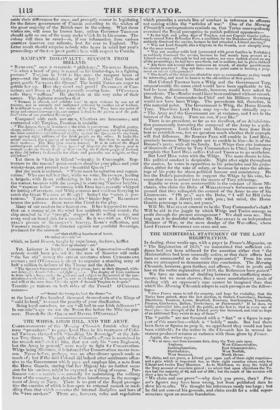THE WHIGS, LOUD HILL, AND THE ARMY.
CORRESPONDENTS of the ir.rning Chronicle furnish -ghat they term " precedents " to guide Lord Thus in his treatment of Colo- nel Thomes, charged with "insulting his Sovereign" at the Ash- ton Tory dinner. The pith of' the Colonel's offence is contained in the remark attrilested to him, that not only his "own Regiment, but the Army in gem ral," were ready to fight for Conservatism. Whigs being Ministers, it is inferred that Conservatism means trea- son. Never before, perhaps, was an after-dinner speech made so much of; but if the said Colonel did indeed utter sentiments offen- sive to the Government which pays and employs him, a note from the Horse Guards, stating that her Majesty has no further occa- sion for his services, might be expected as a thing of course. Par- liament votes a certain suns annually for maintaining the military force of the country, hut abstains from interference in the manage- ment of' Army or Navy. There is no part of the Royal preroga- tive the exercise of which is less open to external remark or med- dling than that which cnneerns the internal discipline and laws .Of the "two services." There ate, however, rules end regulations WhiCh prescribe a certain lino of conduct in imference to offences not coming within the "articles of war." One of the Morning Chronicle's correspondents reminds us, that Tories unscrupulously exercised the Royal prerogative to punish political opponents— In the high and palmy days of Toryism, was not Captain Gawler (after- wards named .Tohn Bellenden Kerr, a candidate for the Dukedom of Roxburgh) suddenly dismissed the service, because he had attended a Liberal meeting?
" Was not Lord Sempill, also a. Captain in the Guards, sent abruptly away for the same reason ?
" Was not another noble lord (connected with great families in Yorkshire) as suddenly dismissed' the service, because be had merely been present at a Liberal meetinc,,; although he hail not spoken, nor even nodded assent on any of the proceedings; he had been seen there, not in uniform, but in plain clothes? " Are there not several other instances on record, of similar punishments for similar practices? May not these cases in point assist in forming a judg. ment on recent delinquencies? " The details of the third case alluded to were as extraordinary as they would be interesting, and must be known to the old soldiers of that period.
Had Colonel THOMAS been a Whig and the Government Tory, unquestionably the cases cited would have been applicable to Isis,
had he been dismissed. Nobody, however, would have asked for precedents. The offender would have been cashiered without remark. But then, the Commander-in-Chief and his Military Secretary would not have been Whigs. The precedents fail, therefore, in this material point. The Government is Whig, the horse Guards Tory. Therefore Lord Thee may say—he does virtually say- " The Army and the Government are at valiance, and I act in the interest of the Army. Turn me out, if you like."
There is no precedent, so far as we recollect, of an Administra- tion permanently intrusting the command of the Army to a poli-
tical opponent. Lords GREY and .Mesnounse have done their best to establish one, but we question much whether their example will find followers. Sir ROBERT PEEL will confide its Lord lieu,
precisely because Whigs ought not to confide in him—he is of the Baronet's party, with all his family. Let Whigs then cite instances of dismissals of Tories by Tory Commanders in Chita; before they
complain that Lord Him. suffers Colonel THOMAS to go scatheless.
But Lord Mu. votes with the Whigs. The more shame to bins, His political conduct is despicable. Night after night throughout the session, he votes in opposition to his principles and his preju- dices, either for the sake of' salary, or because he rates the advan- tage of his party far above political honour and consistency. He has the Duke's permission to support the Whigs by his vote, be- cause that vote is coined into the means of' Tory advantage.
Equally or even more contemptible is the conduct ef these Mi- nisters, who claim the Duke of WELLINGTON'S forbearance on the ground that they relinquish the control of the Army to one of his Lieutenants. ".Oh yes," says the Duke, " I will let Hill (who always acts as I direct) vote with you ; but mind, the Horse Guards patronage is ours, not yours."
Will Mr. Macerreer consent to be the Tory Commander's clerk ? Will he aid in the juggle by which Whigs and Tories manage to profit through the present arrangement ? We shall soon see. Not
long can it be doubtful whether Mr. MACAULAY is an independent Minister of War, or the mere drudge of the War-office, whom Lord FITZROY SOMERSET can cram and use.


























 Previous page
Previous page